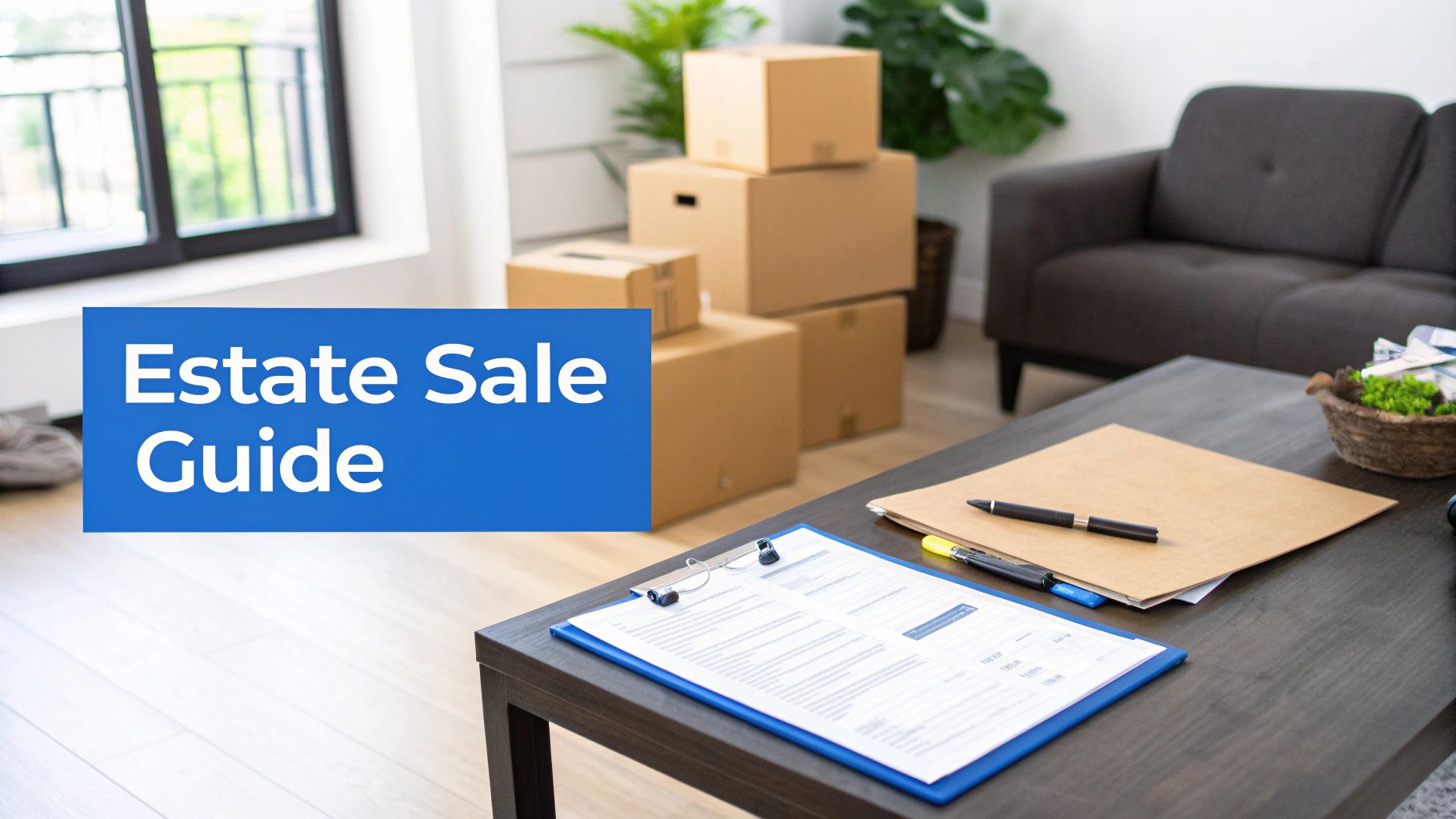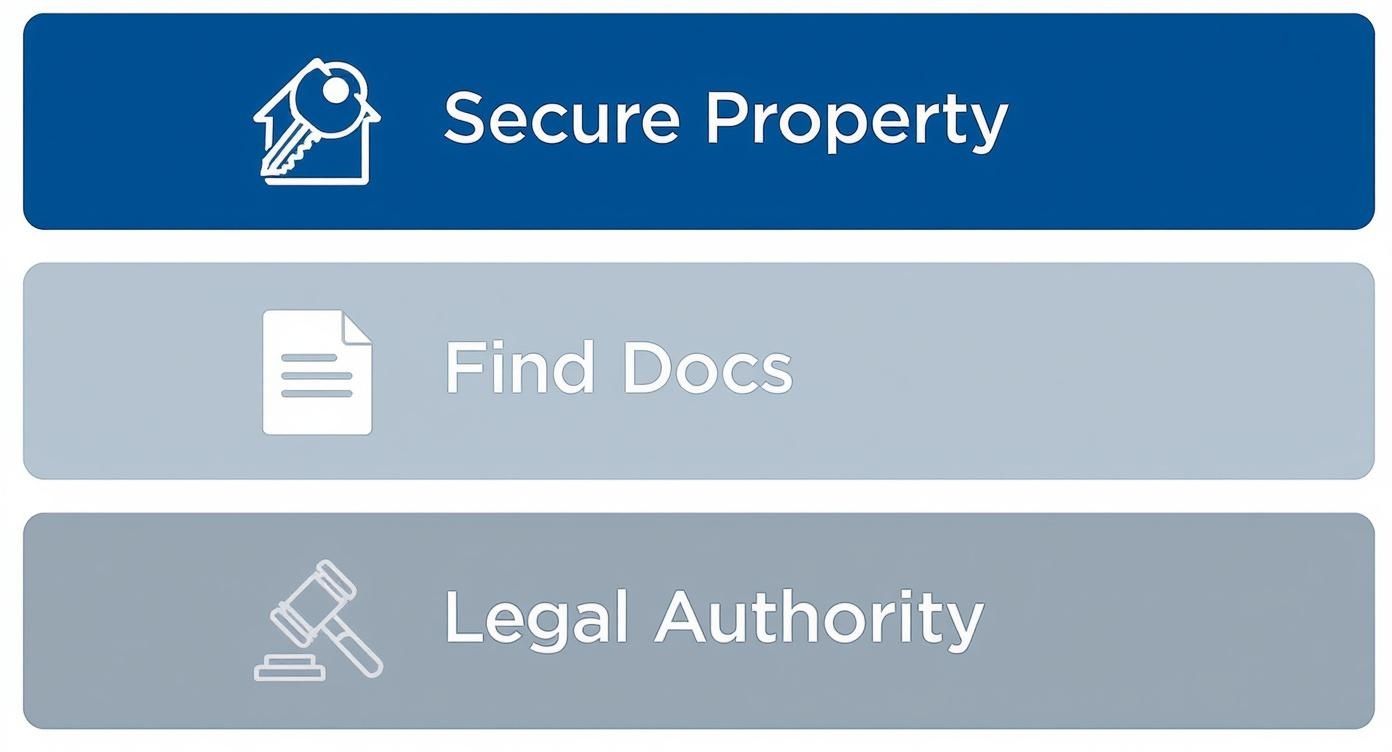A Guide to Dallas Estate Sales for Sellers

Navigating an estate sale in Dallas can feel like a heavy lift, balancing emotional moments with significant financial decisions. But it absolutely doesn't have to be overwhelming.
At its heart, an estate sale is simply a way to sell off the contents of a home, usually triggered by a major life event like downsizing or, more often, the passing of a loved one. Today, modern approaches like online auctions are making the entire process far more manageable and profitable than it's ever been.
Understanding the Dallas Estate Sale Process

Running a Dallas estate sale means you’re working within a specific local market, complete with its own buying trends and city regulations. Think of this guide as your roadmap. We’ll break down the entire journey into clear, practical stages to give you confidence from start to finish. We're covering it all, from the first legal steps to effectively marketing your sale to eager Dallas-area buyers.
This is a whole different ballgame from a typical garage sale. An estate sale involves liquidating a lifetime’s worth of possessions—everything from high-value furniture and art to everyday kitchenware and tools. To get a better sense of the scope, you can check out our detailed guide on what an estate sale really is.
Why Dallas is a Unique Market
The Dallas-Fort Worth metroplex is a seriously dynamic and growing region, and that has a direct impact on the estate sale scene. Just look at the local real estate market, which is a great indicator of demand. It shows strong, steady growth.
For instance, the median sales price for a single-family home in Dallas hit around $425,836 in early 2024. That’s a 2.7% jump from the previous year, fueled by a healthy economy and more people moving to the area. This vibrant climate creates a fantastic pool of potential buyers for your items.
Success in this market really comes down to understanding what local buyers are after—from the mid-century modern furniture that's so popular in neighborhoods like Oak Cliff to the timeless appeal of Western art and decor.
Modern Solutions vs Traditional Methods
For years, hiring a traditional estate sale company was the only real option. The problem? They come with steep commission fees, typically taking 35% to 50% of your total gross sales. That’s a huge cut. Thankfully, modern platforms now offer a much more powerful and profitable alternative.
Here’s a quick look at how they stack up:
- More Control: You're in the driver's seat, managing everything from pricing to the final pickup schedule.
- Higher Profits: With much lower fees, you keep the vast majority of the money you earn.
- Greater Transparency: You can see every bid and every final sale price as it happens, in real-time.
Platforms like DIYAuctions give you the professional-grade tools and support to run your own online auction. We put you in charge of the outcome while helping you maximize what you earn.
First Steps and Dallas Legal Requirements
Before you even think about pricing a single teacup, you need to lay the proper groundwork. Getting the first few steps right sets the stage for a smooth, drama-free estate sale.
Your absolute first move? Secure the property. That means changing the locks immediately. This gives you total control over who comes and goes, ensuring nothing "walks away" before you've had a chance to take inventory.
With the home secured, your next mission is to track down all the important paperwork. We're talking about the will, any trust documents, vehicle titles, and property deeds. These documents are the key to everything—they spell out who owns what and who has the legal authority to sell it.
Determining Legal Authority
So, who are you in this process? Are you the court-appointed executor? The trustee? A family member helping out? This isn't just a title; it's a critical legal distinction.
Only the executor or trustee has the legal right to liquidate the estate’s assets. If that role hasn't been officially sorted out, you might be looking at the probate process. Getting a handle on how to avoid probate in Texas can be a huge time and money saver.
Honestly, this is one area where professional help is worth its weight in gold. Chatting with a Texas estate attorney can help you navigate the maze of probate court and keep you from making a costly misstep.
Navigating Dallas-Specific Rules
You can't just throw open the doors and start selling. Every city plays by its own rules, and Dallas is no different. Forgetting to check local ordinances can get your sale shut down and hit you with a fine.
Here are a few local things you absolutely need to look into:
- City Permits: Head to the City of Dallas website. You need to know if a "garage sale" permit (or something similar) is required for the home's specific address. These rules can change from one neighborhood to the next.
- HOA Rules: If there’s a Homeowners' Association involved, dig up their bylaws. Many have very specific—and very strict—rules about how long sales can run, where you can put signs, and even what days you can hold them.
- Parking and Traffic: Think about the neighbors. For a sale that you expect to be busy, you might need to give the Dallas police a heads-up. This helps manage traffic flow and ensures no one’s driveway gets blocked.
Taking the time to sort out these local requirements isn't optional. A surprise legal snag is the fastest way to derail a perfectly planned sale, adding a ton of stress and costing you money.
The legal side can feel a bit overwhelming, but you don't have to go it alone. For a deeper look at the rules of the road, check out our guide on estate sale laws and regulations. By tackling these foundational steps first, you're building a clear, legal, and successful path for your Dallas estate sale.
Strategic Pricing for the Dallas Market
Let’s be honest: setting the right price is what makes or breaks an estate sale. This is where you can either maximize your profit or leave a ton of money on the table. It’s not just about slapping a sticker on something; it’s about understanding what your items are really worth to a Dallas buyer.
Your starting point is a bit of digital detective work. For everyday items—think kitchen appliances, tools, or that perfectly good guest room furniture—you can get a solid feel for the market by checking "sold" listings on eBay. This shows you what people are actually paying, not just what sellers are asking.
But when you come across things like fine art, antique jewelry, or rare collectibles, it’s time to call in a professional. Don’t guess. Hiring a certified appraiser in the Dallas area is a crucial investment. Their expertise can be the difference between selling a priceless heirloom for pocket change and getting its true value.
Before you even think about pricing, though, there are a few foundational steps you need to have in place.

Making sure the property is secure, locating all the important documents, and confirming you have the legal right to sell are non-negotiable first steps. Get these squared away, and the rest of the process will run much more smoothly.
Tapping into Dallas Buyer Trends
Knowing the local market is your secret weapon. Dallas buyers have distinct tastes, and you can lean into that. Mid-century modern furniture, for example, is still red-hot, especially in neighborhoods full of renovated older homes. And you can bet that vintage western wear or rustic decor will always find a buyer in North Texas.
Getting the price right is everything. It's smart to understand how to effectively price your home for sale in Dallas. While this guide focuses on the house itself, the core ideas about market analysis and comps apply directly to pricing the valuable contents inside it.
Understanding what’s in demand gives you the confidence to price those key items for what they’re worth. This all ties back to the booming local real estate market. Between 2011 and 2023, DFW house prices more than doubled, which means there are thousands of new homeowners out there looking to furnish their places. They are your prime audience.
Advanced Pricing Strategies
Once you’ve got a handle on baseline values, you can get a little more strategic. Tiered pricing is a great tactic. For those unique, high-demand pieces, you can price them firmly. You know a serious collector will meet your price. For more common items, build in a little wiggle room for negotiation—it makes buyers feel like they’re scoring a great deal.
To help you decide which approach works best for different items, here's a quick comparison of common pricing strategies.
Estate Item Pricing Strategy Comparison
| Pricing Strategy | Pros | Cons | Best For |
|---|---|---|---|
| Fixed Pricing | Simple to implement; provides clear price expectations for buyers. | Can be too high and deter buyers, or too low, leaving money on the table. | Common household goods with established market values (e.g., standard furniture, appliances). |
| Negotiable Pricing | Creates buyer engagement; can lead to faster sales. | Can be time-consuming; you might settle for less than you hoped for. | Items where value is subjective or you need to move inventory quickly. |
| Auction-Based Pricing | Lets the market set the price; creates competition that can drive prices up. | Outcome is not guaranteed; requires a platform to manage bidding. | High-demand, unique, or collectible items (e.g., art, antiques, designer goods). |
Each strategy has its place, and a successful sale often uses a mix of all three.
Ultimately, one of the most powerful ways to price is to let the market do it for you. An online auction creates a competitive bidding environment that can push final prices far beyond what you might have set with a simple price tag. It takes the guesswork out of the equation and connects you directly with what Dallas buyers are willing to spend right now.
For a deeper dive, check out our guide on proven strategies for pricing estate sale items.
Marketing Your Sale to Attract Dallas Buyers
Even the most amazing collection of treasures won't sell itself. To really get the most out of your Dallas estate sale, you need a smart plan to get the word out and reach the right people. This process actually starts long before you post your first listing—it begins with fantastic photography and a well-organized catalog.
Think of your online catalog as your digital showroom. The whole point is to make it incredibly easy for potential buyers to browse, get hooked, and find exactly what they’re looking for. A big part of that is grouping similar items into logical lots and writing clear, descriptive titles that grab their attention.
A great title is never just "Old Chair." It’s "Vintage Mid-Century Modern Teak Armchair by Drexel." Why? Because including keywords like the style, material, and brand is exactly how savvy Dallas shoppers find your items through search.

Creating Listings That Sell
Once you have your lots figured out, your photos become your most powerful sales tool. You don't need a fancy professional studio, but taking clear, well-lit pictures that show each item accurately is an absolute must.
Here are a few quick tips I always give people:
- Use Natural Light: Find a spot near a window. Soft, natural light is so much more flattering than a harsh camera flash, which can create ugly glares and wash out important details.
- Show All The Angles: Don't be shy with the camera. Snap photos of the front, back, sides, and any unique features or maker’s marks you can find.
- Highlight The Flaws: This is a big one. Be upfront. If a piece has a scratch or a chip, take a close-up photo of it. Honesty builds trust with bidders and saves you from headaches and disputes down the road.
Your descriptions are there to back up your photos. Make sure to include the item's dimensions, its condition, and any interesting backstory you might know. This context doesn't just inform buyers; it helps them form a connection with the item, which often makes them more willing to bid.
"Your online listing is your one chance to make a first impression. High-quality photos and detailed, honest descriptions are non-negotiable for attracting serious buyers and getting the best possible prices."
Reaching the Dallas Buyer Community
With a great-looking catalog ready to go, it's time to spread the word. Dallas has a really vibrant, active community of estate sale lovers, serious collectors, and resellers. You just have to know where they hang out online.
Posting on established, high-traffic websites is the first critical step for getting eyeballs on your sale. These platforms have a built-in audience of thousands of local shoppers who are already looking for sales just like yours.
Beyond that, don't sleep on the power of social media. Local Facebook groups can be an absolute goldmine for reaching a very specific audience. Just hop on Facebook and search for groups dedicated to things like:
- Dallas-Fort Worth vintage and antique enthusiasts
- Neighborhood-specific buy/sell/trade pages (think "Lakewood Online Garage Sale" or similar)
- Specialty collector groups for things like vinyl records, comic books, or specific furniture styles
When you post, share a direct link to your full online auction catalog and showcase a few of your most exciting items with your best photos. This creates a little intrigue and drives traffic straight to your sale. A single, well-crafted post can create a ton of buzz and bring in bidders you never would have reached otherwise.
Managing Pickup Day and Steering Clear of Scams
Once your auction goes live, your attention pivots from planning to execution. This is where the rubber meets the road—running a smooth pickup day and protecting yourself from common scams are where all your prep work really pays off.
The logistics of a single pickup day, a hallmark of online estate auctions, are surprisingly easy to manage with the right game plan.
The last thing you want is a chaotic free-for-all on your front lawn. The simplest, most effective strategy is to have buyers schedule specific time slots for pickup. This staggers arrivals, keeps your neighbors happy by preventing traffic jams, and gives you the breathing room to handle each transaction personally. Get ready ahead of time by grouping sold items into zones, clearly marked with the buyer’s name or lot number so you can find them in a snap.
Making Pickup Day a Breeze
A well-run pickup day isn't just about efficiency; it's a critical part of your security. It’s your chance to look each buyer in the eye, verify their identity, and confirm their payment has cleared before a single item leaves the property.
Here are a few practical tips I’ve seen work wonders:
- Use Appointment Slots: A free tool like Calendly or SignUpGenius works perfectly. Let buyers pick a 15- or 30-minute window.
- Stage Items in Advance: Before anyone shows up, pull all their items together. If someone won a heavy antique dresser and a box of china, have them both ready near an exit to make loading as painless as possible.
- Verify, Verify, Verify: Keep a simple checklist with each buyer's name and their winning lots. Match their ID to your records and, most importantly, confirm their payment has fully cleared through the platform before they start loading.
Security isn’t just about stopping someone from walking off with an item. It's about making sure every single transaction is legitimate from start to finish. A secure, integrated payment system is your single best defense against the scams that plague private sellers.
How to Spot and Sidestep Common Scams
Unfortunately, fraudsters love to target private sellers in high-value sales, and Dallas estate sales are no exception. Just knowing their playbook is half the battle.
One classic scheme is the "overpayment" con, where a buyer sends a fake check for more than the purchase price and asks you to wire them the difference. Another is the chargeback scam—a buyer pays with a credit card, picks up the item, then immediately disputes the charge with their bank, claiming it was fraudulent.
Using a platform with built-in fraud protection and verified payment processing takes these risks off the table. It ensures every dollar is legitimate and secure before you hand over the goods. This is especially important in the Dallas market right now. Recent 2025 data shows a softening market—home sales are down and inventory is up, which can make sellers anxious to close deals fast and potentially miss red flags. You can learn more about these Dallas real estate market trends at Orchard.com.
By sticking to a secure, verified process, you can navigate your sale with total confidence, knowing you'll get paid correctly for every single item you sell.
Answering Your Dallas Estate Sale Questions
Even with a great plan, questions are going to pop up. Running a Dallas estate sale is a big job, and it’s smart to get some clarity before you dive in. We’ve pulled together the most common questions we hear from folks in Dallas to give you the straightforward answers you need.
What’s the Going Rate for a Traditional Estate Sale Company in Dallas?
This is almost always the first thing people ask, and for good reason—you need to know the costs. Most traditional estate sale companies in Dallas work on commission, taking a cut of the total gross sales.
You can expect that commission to land somewhere between 35% and 50%. While that fee covers their services like staging the home, pricing every item, and staffing the sale days, it's a huge slice of the pie. Frankly, this high-cost model is a major reason why so many sellers are now looking for alternatives, like online auctions, where the fees are much lower and more of the money stays with the estate.
What Actually Sells Well at Estate Sales Around Here?
Every home is different, but we see clear trends in what buyers in the Dallas-Fort Worth area are consistently hunting for. Knowing what’s hot can help you spotlight the right items when you market your sale.
A few categories almost always do great:
- Quality Furniture: Solid wood pieces are a big one, especially anything with a mid-century modern vibe. New homeowners and designers snap those up.
- Tools and Equipment: Power tools and good-quality hand tools are a sure bet. There’s a huge market of hobbyists and professionals looking for a deal.
- Fine Goods: Things like sterling silver, fine jewelry, and firearms always bring in serious collectors and investors.
- Texas-Themed Stuff: Don't underestimate local pride! Western art, old Dallas memorabilia, or anything with a distinct Texas feel has a very dedicated group of buyers.
The real takeaway here is that value is hiding everywhere. From a high-end antique to a box of tools in the garage, you’ll find eager buyers for almost everything in a market as active as Dallas.
Do I Have to Completely Clean Out the House Before Selling?
Absolutely not. But you do need to be strategic. The most critical first step is to walk through and pull out everything that is not for sale. This means family photos, personal papers (think birth certificates and financial records), and any heirlooms the family has decided to keep.
Your job is preparation, not perfection. The golden rule is simple: do not throw anything away until you’ve had a chance to figure out what it's worth. That dusty box you’ve been ignoring in the attic could be a goldmine. With an online auction, your main focus is just making sure items are accessible enough to be photographed clearly. This is a massive time-saver compared to a traditional sale, where you’d spend days deep cleaning and staging the entire house.
What Happens to the Stuff That Doesn’t Sell?
It’s almost a guarantee you’ll have some things left over. Don’t worry—you’ve got several great local options for clearing out the rest.
Donation is usually the first choice. Charities in the Dallas area like Goodwill or The Salvation Army are fantastic resources. Many will even schedule a pickup for larger donations, which makes your life a whole lot easier.
Another route is to call an estate cleanout or junk removal service. These companies are pros at clearing properties fast. Some might even offer you a "buyout" for everything that's left, giving you a single check for the lot. Just know that you'll be getting pennies on the dollar compared to what the items could have sold for individually.